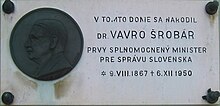Vavro Šrobár
Vavro Šrobár (born August 9, 1867 in Liszkófalu , Liptov County , Kingdom of Hungary , today Lisková ; † December 6, 1950 in Olomouc ) was an Austro-Hungarian doctor , enlightener and Czechoslovak politician . As head of the 'Ministry with Authority for the Administration of Slovakia' ("Ministerstvo s plnou mocou pre správu Slovenska"; 1918–1920) he was de facto the first head of government of the Slovaks after their integration into the Czechoslovak Republic.
Life
Šrobár was born into a farming family of twelve. Because of his talent, his father sent him to school and later continued his education at grammar schools in Ružomberok , Levoča and Banská Bystrica . Because of " Pan-Slavic agitation" he was excluded from all Hungarian schools before he finished his Abitur, which is why he graduated from the grammar school in Přerov in 1888 .
After graduating from high school, he decided to study in Prague , where he joined the newly founded Slovak student association Detvan and became one of its spokesmen. At this time, the first contacts arose with the promoter of Slovak-Czech political cooperation Tomáš Garrigue Masaryk , whose friend and political supporter Šrobár was to remain throughout his life. In addition, in 1898 he co-founded the Slovak magazine Hlas , which he was to publish until 1904.
Until 1918 worked as a doctor in Ružomberok. In addition, he ran unsuccessfully for the Hungarian parliament in 1906 ; At that time he and Andrej Hlinka were charged with "inciting against the Hungarian nationality" and sentenced to one year in prison.
During the First World War , Šrobár worked for the Czech underground organization Maffie . After the end of the war and with the establishment of Czechoslovakia , he became politically active, and until his death in 1950 he participated in various cabinets in changing departments, including as Minister of Health, Minister of Education and Minister for Slovak Affairs in the Karel Kramář government and Minister of Finance . He was party-bound to the Agrarian Party, for which he was a member of the Czechoslovak National Assembly from 1925 to 1935 .

In terms of political orientation, he always remained a Czechoslovakist and accordingly came out against separatist tendencies in Slovak politics and against the Hlinka party . In addition to his political activities, he lectured at the UK Prague from 1922 ; since 1935 he had the title of professor.
During the Slovak National Uprising he was one of two chairmen of the SNR together with K. Šmidke . Lacking insight into the political tactics of the leaders of the uprising around Gustáv Husák , he exercised this function under their influence, so that, contrary to his Czechoslovakist convictions, he took part in the separate negotiations of the SNR in Moscow.
After the Second World War , Šrobár continued his political activity as a minister. Outcast from the Democratic Party, he founded the Slovak Strana slobody ( Freedom Party ) in 1946 . As one of the few statesmen of the First Republic, he worked with the Klement Gottwald government after the February revolution of 1948 , where he held the post of Minister for the Unification of Laws.
Fonts
- Naše snahy ( Eng . Our Troubles ; magazine article), Hlas 1898
- Maďarizácia (German Magyarization , magazine article), Hlas 1900
- O československej vzájomnosti ( Eng . About Czechoslovak reciprocity ), Prúdy 1901
- Vzájomnosť československá (German Czechoslovak reciprocity , magazine article), Hlas 1902
- Viera a veda (German: Faith and Science ), Prúdy 1913
- Vláda ľudu v demokracii (German popular rule in a democracy ), 1919
- Osvobodené Slovensko (German: Liberated Slovakia ), Praha 1928
literature
- I. Kružliak: Šrobár, Vavro . In: Biographical Lexicon on the History of Southeast Europe . Volume 4. Munich 1981, p. 159 f.
- Encyklopedický institut CSAV (ed.): Československý biografický slovník . Prague 1992, ISBN 80-200-0443-2 , p. 709.
- I. Chalupecký: Šrobár Vavro. In: Austrian Biographical Lexicon 1815–1950 (ÖBL). Volume 13, Verlag der Österreichischen Akademie der Wissenschaften, Vienna 2007–2010, ISBN 978-3-7001-6963-5 , p. 62 f. (Direct links on p. 62 , p. 63 ).
Web links
Individual evidence
- ↑ Sv. Hurban Vajanský: Ružomberský kriminálny proces proti Andrejovi Hlinkovi a spoločníkom ( Eng . The criminal trial of Ružomberok against Andrej Hlinka and accomplices ). Turč. Sv. Martin 1906.
| personal data | |
|---|---|
| SURNAME | Šrobár, Vavro |
| BRIEF DESCRIPTION | Austro-Hungarian physician, educator and Czechoslovak politician |
| DATE OF BIRTH | August 9, 1867 |
| PLACE OF BIRTH | Lisková , Kingdom of Hungary |
| DATE OF DEATH | December 6, 1950 |
| Place of death | Olomouc |